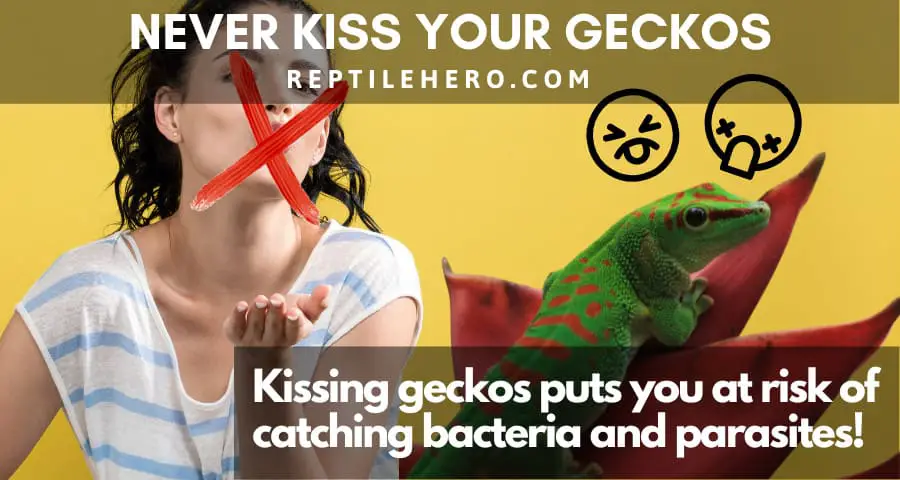Are Geckos Dangerous to Humans? (Can They Hurt You?)
Personally, I’ve never thought that common house geckos as being dangerous. Sure, house geckos can be quite the nuisance—leaving their droppings all over the place! But could they possibly bring more harm to you at home than you realize?
Generally, crested, leopard, and other gecko species are harmless to humans. A gecko’s bite can result in generally mild to moderate pain. Wild geckos that enter could carry bacteria such as salmonella which could cause diseases unlikely caused by shop-bought geckos.
Of course, there are valid concerns that come with letting wild house geckos into our warm homes. As long as you keep your place clean and don’t kiss these critters though, you don’t really have to worry about getting hurt. Read on to find out more!
Can a Common House Gecko Hurt You?
House geckos coming from the outside are not dangerous to humans. Even in the rare case that they bite, this will not normally break the skin and cause bleeding. The only issue is the potential transmission of disease.
Here’s the short answer: letting geckos into your home is in no way equivalent to welcoming significant danger. In fact, numerous institutions consider most species of house geckos to be completely harmless to humans [1, 2].
The two most common house gecko species in America that are found in houses and well-lit residential areas are:
- Asian house gecko (Hemidactylus frenatus)
- Mediterranean house gecko (Hemidactylus turcicus)
Due to their substantially smaller size compared to us—even kids—it is very unlikely for them to intentionally approach us and bite us to inflict any harm. What’s more likely to happen is that they scurry away at the sight of you since you’re a huge threat to them.
If anything, their bites can only deal serious damage to other smaller and younger geckos as well as their prey.
Find out more on lizard nips in our article on gecko bites.
So the only way these little geckos could ever possibly hurt you is by transferring harmful pathogens and organisms to you. However, even the chances of that happening is very slim.
Should you get rid of the house geckos you find in your house?

Unless people are facing a serious case of home infestation because of geckos, most experts advise against getting rid of them even in residential areas. This is because house geckos play an important role in keeping unwanted insect populations low. Such insects they prey on include flies, flying termites, and mosquitoes.
How Can House Geckos Harm Humans?
The only case house geckos can be dangerous and cause harm to humans is through bacteria or parasite infections that can happen if:
- The infected gecko is ingested.
- The infected gecko’s droppings are consumed/left to accumulate.
- The infected gecko has contaminated the utensils and kitchenware.
- The infected gecko comes in direct contact with open wounds/broken skin.
- A person does not practice good hygiene.
In other words, unless you live in a pig sty, you won’t have to concern yourself with the possibility of getting sick due to the house geckos running across your ceiling. Then again, you should familiarize yourself with what harmful organisms they could carry [3, 4, 5].
Here are 13 of the most common bacteria and parasites geckos can carry:
- Aeromonas (Aeromonas sp.)
- Campylobacter (Campylobacter jejuni)
- Clostridium (Clostridium botulinum)
- Cryptosporidium (Cryptosporidiumsp.)
- Giardia (Giardia sp.)
- Mycobacterium (Mycobacterium sp.)
- Leptospira (Leptospira spp.)
- Liver flukes (Mesocoelium meggitti)
- Pentastomic crustaceans (Raillietiella spp.)
- Roundworms (Cosmocercoides variabilis, Oswaldocruzia pipiens, Parapharyngodon cubensis, Physaloptera sp.)
- Salmonella (Salmonella sp.)
- Tapeworms (Mesocestoides sp., Oochoristica spp.)
- Trichinella (Trichinella spp.)
Keep in mind that the aforementioned organisms can not only affect you and your family but also your other pets if you have any—regardless if they are furry or scaly babies.
How Did House Geckos Get to America?
The Asian and Mediterranean house geckos were inadvertently brought to America and most other parts of the world—except for Antarctica—via international movement of cargo and shipping.
Other non-native geckos species have also established strong populations near various urban and residential areas in the same manner. Some others have grown in number after being released from captivity in hopes of aiding with local pest problems.
Below are other native and establish gecko species in the United States of America:
- Gold dust day gecko (Phelsuma laticauda)
- Indo-Pacific house gecko (Hemidactylus garnotii)
- Moorish gecko (Tarentola mauritanica)
- Mourning gecko (Lepidodactylus lugubris)
- Peninsula leaf-toed gecko (Phyllodactylus nocticolus)
- Reef gecko (Sphaerodactylus notatus)
- Reticulated banded gecko (Coleonyx reticulatus)
- Switak’s banded gecko (Coleonyx switaki)
- Texas banded gecko (Coleonyx brevis)
- Tokay gecko (Gekko gecko)
- Western banded gecko (Coleonyx variegatus)
Compared to house geckos, some of these are quite big. The tokay, for instance, is quite infamous for its violent behavior and strong bite even as a captive-bred pet
Do Pet Geckos Pose Any Harm for Reptile Owners? (2 Ways)
Similarly, wild-caught pet geckos can also carry bacteria and parasites which can be harmful to humans and pets. However, this is rarely the case for captive-bred geckos from good breeders. Nevertheless, popular species that are bigger could cause painful bites in humans.
Let me explain this to you in greater detail!
1. Gecko-Borne Diseases
As you have probably guessed, captive-bred pet geckos are less likely to bring any harm to you and your family.
The only exemption to that of course is if your new scaly baby is a non-native wild-caught specimen—which could undoubtedly be harboring several unwanted organisms.

Furthermore, your pet geckos are unlikely to harm you if you don’t:
- Kiss your pet gecko
- Put it in and/or around your mouth
- Let in walk all over your kitchen counters
- Wash tank tools and equipment in the kitchen sink
- Allow droppings to accumulate in its tank
If you do want to bond and spend time with your precious scaly baby, there are far safer ways to do so.
Learn more about safely bonding with geckos in our article on petting geckos.
2. Geckos Bites
Being bitten by most commonly kept gecko species, such as leopard geckos and crested geckos, is rarely painful or bloody. However, that doesn’t mean gecko owners are never bitten by their pets.
Recently, I have seen more and more newbie gecko owners complain about how painful pet gecko bites can be. These incidents typically happen when beginner keepers forcefully try to handle recently obtained geckos—which is a very big no-no.
Discover how to properly let your gecko get used to you in our article on handling geckos.
That said, even bigger species like tokays and Leach’s giant geckos (Rhacodactylus leachianus) have stronger bites that can easily pierce through the skin. Such bites can hurt even worse if you try to forcefully remove the offending gecko’s bite.
Does body size affect a gecko’s bite force?
Yes, a gecko’s body size affects its bite force. Research shows that both head size and overall body size strongly correlate with an animal’s bite force. In other words, a tokay gecko will have a stringer average bite force compared to leopard geckos.
Further Questions
What is the most dangerous gecko?
No gecko is known to be significantly dangerous to humans and other common pets. However, tokay geckos are largely recognized by the reptile community as being one of the most aggressive species due to their powerful bites. This is true for wild and pet tokays. Nevertheless, experienced breeders suggest that certain morphs are very tame and docile.
Are geckos poisonous or venomous?
Geckos are neither venomous nor poisonous. However, the Gila monster (Heloderma suspectum) and other large lizards, such as the Mexican beaded lizard (Heloderma horridum) and Komodo dragon (Varanus komodoensis), are venomous. That said, deaths due to bites from these big venomous lizards are extremely rare—dating back to 1939.
Can geckos hurt other common pets like cats and dogs?
Due to their smaller size, house geckos and pet geckos can’t readily hurt common pets like cats and dogs. Rather, geckos are more likely to be harmed by these pets. Nonetheless, a gecko can make your dog or cat sick if it eats the small reptile. The effects can range from a simple stomach upset to a serious illness due to bacteria and pathogen geckos may carry.
Are geckos violent animals?
No, geckos are generally not violent reptiles. Normally, they will only act aggressively towards humans if they feel threatened. Aside from that, the Western banded gecko (Coleonyx variegatus) in particular is known to be very violent when capturing scorpions. They smash prey scorpions around repeatedly to immobilize them by blunt force trauma.
Can geckos get sick from humans?
Unlike other mammals, pet reptiles like geckos can’t get sick from humans. Geckos can’t catch colds, flu, or any other human illness from their owners. It is highly unlikely for them to get infected by bacteria and parasites from humans as well, especially when proper hygiene and husbandry practices are followed by reptile owners.
Is it possible to develop allergic reactions to geckos?
Although geckos and reptiles, in general, are assumed to be non-allergenic, there are rare documented cases of people developing allergic reactions to these animals. Symptoms of reptile allergies are similar to most other animals, namely respiratory issues. Gecko owners with sensitive skin have experienced adverse skin reactions to reptiles.
Why do people think geckos are dangerous?
Some people think that geckos are dangerous because of the culture they belong to. Depending on their cultural background and upbringing, their superstitions regarding geckos can either be positive or negative. For example, geckos are considered symbols of good luck in Turkey but they are generally thought to be signs of bad omens in India.
Summary of Are Geckos Dangerous to Humans?
Neither wild house geckos nor pet geckos pose a significant danger to humans. This is one of the main reasons why geckos are increasingly kept as pets with great popularity. However, they can still be rather harmful in a few cases.
Wild house geckos are more likely to make humans sick as they naturally carry more malignant microorganisms and parasites. However, their bites are largely uncommon and hardly felt.
By contrast, common pet geckos are much larger and therefore more likely to cause painful bites that may or may not cause bleeding in humans. On the other hand, they are far less likely to carry organisms that could cause the development of diseases in humans.
Sources
[2] https://aggie-horticulture.tamu.edu/galveston/beneficials/beneficial-17_lizard_gecko.htm
[3] https://animaldiversity.org
[4] https://www.hpsc.ie/a-z/zoonotic/reptilesandrisksofinfectiousdiseases/
[5] https://www.mallardcreekvet.com/dr-waldens-blog/zoonotic-diseases-of-reptiles-and-amphibians

![5 Causes of Denting on Your Gecko Eggs [and 4 Solutions]](https://www.reptilehero.com/wp-content/uploads/2021/03/G38-768x614.jpg)
![9 Woods Safe For Gecko Tanks [and 16 to Avoid]](https://www.reptilehero.com/wp-content/uploads/2021/04/Wood-Avoid-Gecko-Tank-768x614.jpg)
![Taking Care of Geckos During Power Outages [Final Guide]](https://www.reptilehero.com/wp-content/uploads/2021/04/Gecko-Care-Power-Outage-768x614.jpg)


![The 5 Reasons Why Do Your Geckos Jump [and 5 Precautions]](https://www.reptilehero.com/wp-content/uploads/2022/01/why-geckos-jump-cc-768x614.jpg)
